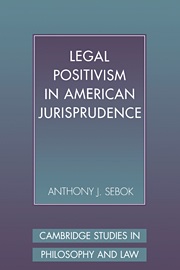Book contents
- Frontmatter
- Contents
- Acknowledgments
- 1 Why Study Legal Positivism?
- 2 Positivism and Formalism
- 3 The Varieties of Formalism
- 4 Legal Process and the Shadow of Positivism
- 5 The False Choice Between the Warren Court and Legal Process
- 6 Fundamental Rights and the Problem of Insatiability
- 7 New Legal Positivism and the Incorporation of Morality
- Index
7 - New Legal Positivism and the Incorporation of Morality
Published online by Cambridge University Press: 16 October 2009
- Frontmatter
- Contents
- Acknowledgments
- 1 Why Study Legal Positivism?
- 2 Positivism and Formalism
- 3 The Varieties of Formalism
- 4 Legal Process and the Shadow of Positivism
- 5 The False Choice Between the Warren Court and Legal Process
- 6 Fundamental Rights and the Problem of Insatiability
- 7 New Legal Positivism and the Incorporation of Morality
- Index
Summary
THE EMERGENCE OF NEW LEGAL POSITIVISM
Weak Epistemic Natural Law collapses into strong epistemic natural law because once the ground of law is morality, no nonmoral reason can cabin it. For some conservative legal process scholars, such as Bickel, Bork, and Wechsler, the insatiability of justice was not a problem, because, as we saw in Chapter 5, they did not believe that morality could be objective, and therefore did not think that moral reasoning was anything other than the expression of subjective preference. For these theorists, all law could do was capture the personal preferences of its framers. Hence, adjudication was the application of the original intentions of a law's framers to a set of facts.
If the only positivist reaction to the fundamental rights approach were the originalism of Bickel, Bork, and Wechsler, then the final chapter of legal positivism in the United States would have been a story of a decline into irrelevancy, with the final scene being, perhaps, the defeat of Robert Bork's nomination to the Supreme Court in 1987. Since the late 1980s, originalism has lost much of its influence both in the academy and among the public.
Legal positivism has generated another, much more powerful response to the fundamental rights approach that is rooted in neither moral skepticism nor originalism.
- Type
- Chapter
- Information
- Legal Positivism in American Jurisprudence , pp. 267 - 318Publisher: Cambridge University PressPrint publication year: 1998



